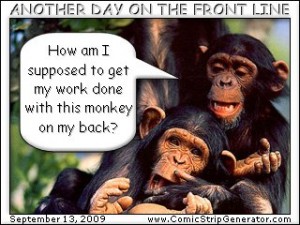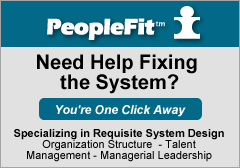Mission Minded Management Turns Two – I’m OK. You’re OK. Let’s Fix the System.
By Michelle Malay Carter on September 25, 2009
 Turning two this week is Mission Minded Management, PeopleFit’s organization design,?executive leadership, and?operational management blog that draws its theory from the meta-model Requisite Organization and draws its contents from the author’s work and life experiences.?
Turning two this week is Mission Minded Management, PeopleFit’s organization design,?executive leadership, and?operational management blog that draws its theory from the meta-model Requisite Organization and draws its contents from the author’s work and life experiences.?
Thank you for your continued?support and readership.? Please send a link to a friend!
Here were the most-read posts published this year:
- Managerial Accountability is not MISSING it’s just MISPLACED
- If You Want Accountability, You Must Grant Authority
- Job Analysis Via Time Span of Discretion – A Universal Level of Work Measure
- Employee Engagement Kiss of Death – Ignoring Performance Issues
- Young High Potential Leaders -?Use Wait Time to Build Character
And our all time most-read posts:
- I Didn’t Say You Stole My Money – Why You Should Deliver Sensitive Messages in Person
- Exceptional Customer Service Flows from Sound Organizational Design
- Innovation Snobbery is Not Serving Organizations
- Where Jack Welch Got It Wrong – The Mandatory Annual Low-Performer Cut
- Not All Work is Equal – Exploring Work Levels 1 – 4
I’m OK.? You’re OK.? Let’s keep contending for fixing the system!
Filed Under Accountability, Corporate Values, Employee Engagement, Executive Leadership, High Potential, Managerial Leadership, Organization Design, Requisite Organization, Work Levels | Comments Off on Mission Minded Management Turns Two – I’m OK. You’re OK. Let’s Fix the System.
Operations Can Only Do So Much – When Will Boards Hold Executives Accountable for Executive Level Work?
By Michelle Malay Carter on September 23, 2009
 Clarifying Accountability
Clarifying Accountability
When will we fully appreciate that the operational levels, aka work levels 1-3,?within an organization can only work within the confines set at the executive/strategic levels?
Who Sets the Conditions?
What do the executive levels directly control?? Executive levels:
- Create the strategy
- Decide the “business brand”
- Obtain the funding
- Select the geographic markets
- Design the products/services
- Prioritize the target market
- Choose the delivery channels
- Supply the infrastructure
- Provide the resources
Operational Accountabilities
The operational levels are accountable to steward and make best use of the resources,?to refine and?optimize processes, to assure operational quality, and to adequately train and monitor front line employees to create products or deliver services.?
Sleeping at the Wheel
Sleeping at the wheel has fairly short feedback loops in the operational world.? Operational workers caught doing this don’t last long.? Executive sleeping at the wheel is a far more insidious issue, and it has far more wide reaching ramifications.
When? a company is in danger, operational cost cutting and waste reduction is like bailing a sinking ship with a teaspoon.
Where is the Governance?? What are Boards of Directors Doing?
It’s time for executives to put their big boy and big girl britches on and stop making operations carry the weight of executive level incompetence in system design and strategic insight.?
I’m OK.? You’re OK.? Let’s fix the system.
Filed Under Requisite Organization | 6 Comments
Who Is Accountable for “The Customer Experience”? Maybe Not Who You Think
By Michelle Malay Carter on September 13, 2009
 Customer Experience Surveys
Customer Experience Surveys
As an add on to my thoughts about scapegoat syndrome, I wanted to add a caution around data derived from customer experience surveys.? Are you measuring what you think you are measuring with these surveys?
As Much about Systems as Customer Service
When you ask a customer how their experience with your organization was, you are measuring the quality of your systems as much as you are measuring your front line employees’ effectiveness.?
Measure, Measure, Measure
Measures are great, but they do not tell the whole story.? In our rush to quantify everything, some organizations are putting monkeys on the backs of the front employees that aren’t theirs to carry.
For What is the Front Line Employee Accountable?
Generally the front line employee is to deliver a service as trained within the policies set up by management.? They are to balance their pace and quality while maintaining a positive demeanor.
For What is the Front Line Employees NOT Accountable? (Note the Longer List)
- The quality and comprehensiveness of the training they receive
- Their level of empowerment to take care of customer needs
- Company policies and procedures
- Adequate staffing levels to ensure prompt service for customers
- Adequate inventory levels and the systems to allow for this
- Accurate sales and marketing messages that influence customer expectations
- The accuracy of the prices being advertised versus charged
- The tools, technology, and resources they are provided to do their job
- The product and service offerings of the organization
- The volume of demand for products and services
- Ensuring feedback loops within the system to identify and correct poor systems and policies
How Do We Get Accountability and Engagement?
We will get accountability when learn how to pin appropriate accountability to the appropriate level.? To do this, we will need to understand work levels.?
Accountability Must Equal Authority
We will get engagement when employees view their workplace as trust-inducing and fair.? Much of that is related to systems design.? Holding me accountable for things over which I have no authority or influence is an employee engagement killer.? We?do this with our front line staff every day, and then we give them a pep talk and tell them to put on a happy face for our customers.
I’m OK. You’re OK.? Let’s fix the system.
Have you ever been held accountable for something over which you had no authority or influence?
Filed Under Accountability, Employee Engagement, Organization Design, Requisite Organization, Talent Management, Work Levels | 7 Comments
It’s Not About FINDING Talent. It’s about IDENTIFYING and TAPPING What You Already Have
By Michelle Malay Carter on September 3, 2009
 I answered the following question posted on LinkedIn, and I’m posting my response for your enjoyment:
I answered the following question posted on LinkedIn, and I’m posting my response for your enjoyment:
What are the most important factors needed to be considered for effectively managing talent?
Talent, Talent Everywhere
PeopleFit research, with over 7,000 data points, finds that about 20% of employees are UNDERUTILIZED. So the problem does not lie with FINDING talent. It lies with IDENTIFYING it, because 1 in 5 employees sitting within organizations today could be performing higher level work, given the opportunity.
Why do we need talent? To work, of course. But is all work equal? No.
So step one is understanding requisite work levels.
Step two is understanding how to match people to work.
Step three is putting the two together.
We Already Know This, We Just Don’t Have a Language for It
What is missing is a common (science-based) language to talk about these issues, organization design and engineering principles based upon these science-based findings, and a process for the application of the knowledge and principles.
Given this, managers with their managers’ help are quite capable of effectively identifying talent and putting their employees into positions that allow for their “best use”.
Why Employee Engagement is so Low
Right now, about 35% are misplaced. Add to that the fact that 39% have been provided a leader (manager) who is not in the optimal position to provide them appropriate leadership, and we have the mess we have today with engagement sitting at about 20%.
I’m OK.? You’re OK.? Let’s fix the system.
Have you ever sat underutilized in an organization waiting for your talent to be tapped?? Do tell.
Filed Under Employee Engagement, Organization Design, Requisite Organization, Talent Management, Work Levels | 3 Comments
NonCommission Sales Compensation – Is this Blasphemy?
By Michelle Malay Carter on August 24, 2009
 Show Me the Logic
Show Me the Logic
Should sales people be held accountable for their effectiveness (which includes?output as one input)?but their managers ultimately accountable for their output.? This is the standard of accountability that I have proposed be used for all employees.? If we held sales people accountable to the same standard as all employees, does it make sense to pay them any differently?
My colleague, Craig Tamlin,?with PeopleFit Australasia has written an article proposing non-commission based sales compensation.? Read his article here.
I’m OK.? You’re OK.? What do you think?? Do sales people rate another system?
Filed Under Accountability, Employee Engagement, Felt Fair Compensation, Requisite Organization, Strategy, Talent Management | 6 Comments
How to Avoid Scapegoat Syndrome – Understand Work Levels
By Michelle Malay Carter on August 14, 2009
 Scenario:? A safety violation occurs at work on the front line.? Who is accountable? ?Understanding work levels can answer this question.
Scenario:? A safety violation occurs at work on the front line.? Who is accountable? ?Understanding work levels can answer this question.
Bye Bye Employee Engagement
Holding the wrong person accountable reduces trust and fairness, and these are two precursors to engagement.
Work Level 1 Accountability – The Front Line Employee
Work to procedures and training.? To produce an output or deliver a service to specification.
Therefore, if a front line employee knowingly and willingly chooses not to follow a safety procedure, the accountability lies with him or her.
Work Level 2 Accountability – The Front Line Manager
Ensure all employees under their leadership are fully trained and capable to perform their duties.
Therefore, if a front line employee was not trained in safety procedures, the accountability lies with the Front Line Manager.
Work Level 3 Accountability – Manager of Front Line Managers (Department Manager, District Manager, etc.)
Best practices, contingency planning, serial processes and methods
Therefore, if the safety training lacked the necessary scenario planning and it did not include training on the various “what ifs” surrounding the situation, the accountability lies with the Level 3 manager.
Work Level 4 Accountability – Functional Manager
Systems design and development that provide comprehensive leadership and coverage of a function to include organization design, role specification, talent management, physical resources, equipment, facilities, training, budget, etc.
Therefore, if the functional manager did not call for safety training and/or not fully specify the varying levels of role accountability related to the safety training, the accountability lies with the Level 4 manager.
Executives are Not Being Held Accountable for Executive Level Work – Systems Design
It has been my experience that fully specifying accountabilities and effective system design is not occurring at the L4+ (executive) levels.? But how often do you see an executive getting canned due to a front line safety violation?? It’s easier just to fire the front line employee.? Shame on the system.
I’m OK. You’re OK.? Let’s fix the system.
Have you ever been a victim of scapegoat syndrome?? Baa-aa-aa
Filed Under Accountability, Employee Engagement, Executive Leadership, Organization Design, Requisite Organization, Work Levels | 5 Comments
Performance Review or Effectivness Appraisal – Be Mindful of What Your Systems Communicate!
By Michelle Malay Carter on August 5, 2009
 I worked?with?a client this week conducting requisite role analysis and?writing job descriptions.? Although this?project is not about?performance review, we recognize that these job descriptions?will then become the basis for performance review.
I worked?with?a client this week conducting requisite role analysis and?writing job descriptions.? Although this?project is not about?performance review, we recognize that these job descriptions?will then become the basis for performance review.
Be INTENTIONAL Please
Systems drive behavior so the systemic implications for the way the performance review is designed, and its stated strategic intent are HUGE.
Geary Rummler sums up the situation brilliantly when he says:? “Pit the most motivated employee against a poor system, and my money is?on the system every time.”
Best Intentions Don’t Always Lead to Best Practices
Elliott Jaques didn’t use the term performance review because it lends itself to measuring outputs.? What managers really need to be doing is judging employee effectiveness.? Reviewing outputs should be one consideration in judging employee effectiveness, but trying to make employee reviews 100% objective by measuring outputs a noble intention with dangerous unintended consequences.
If I am only accountable for what I have done, but not how I went about doing it – um, trouble ahead.? And if you’ve designed your performance management system to induce managers to be singly focused upon results rather than effectiveness, you’ve closed the loop on this vicious cycle.
Work is the exercising of judgment and discretion to solve problems.? We pay people to think not compute, machines do that.? Judging employee effectiveness with always involve judgment, it cannot be objective.? This makes most HR people squirm because the attorneys loom large, but the threat of lawsuits has created an unjust situation at work.? Remember, if I don’t trust the systems of an organization are fair, engagement is unlikely.
Systems Drive Behavior – The Craziness at GE Fueled By Jack Welch
My second most popular post at Mission MInded Management is my ranting about the craziness induced by GE Jack Welch’s cut the bottom 10 percent talent management system.
Performance Review or Effectiveness Appraisal?
This is why Elliott Jaques used the term, Personal Effectiveness Appraisal, rather than Performance Appraisal.? It looks at your effectiveness relative to the work of your role.? It does not involve pitting you against others in an effort to get a bell curve.
I’m OK.? You’re OK.? Let’s fix the system.
Unfair Workplaces
Have you ever “made your numbers’ while slacking off?? Have you ever missed your numbers but performed extremely effectively in light of the circumstances – loss of a large client, economic downturn?? Did your managers recognize only outputs or did s/he recognize your effectiveness?
Filed Under Accountability, Corporate Values, Organization Design, Requisite Organization, Talent Management | 2 Comments
Employee Engagement Kiss of Death – Ignoring Performance Issues
By Michelle Malay Carter on July 24, 2009
 Subodinating the Moment for the Greater Goal
Subodinating the Moment for the Greater Goal
Since my kids don’t read my blog, I have to admit that there are times when I pretend not to see rule violations in my home, because I don’t have the energy to deal with them.? However, if it is obvious that I have witnessed an infraction, I like to believe I’m on it.? What is the alternative – a slippery slope to anarchy.
Managerial Leadership Requires Courage
I’ve said 100 times that trust and fairness are precursors to employee engagement.? If managers turn their backs on issues, EVERYTHING breaks down.
What managers are saying by this abdication of their performance management leadership duty is:
-The rules apply only some times.
-The rules apply to only some people.
Try gaining accountability in an arbitrary environment like that.
Try gaining consistency in an arbitrary environment like that.
Try gaining quality in an arbitrary environment like that.
Try gaining engagement in an arbitrary enviroment like that.
Ever worked in an enviroment like that?
I’m OK.? You’re OK.? Let’s fix the system.
Filed Under Accountability, Corporate Values, Employee Engagement, Managerial Leadership, Requisite Organization, Talent Management | 11 Comments
On Vacation – NC, VA, WV, OH and Back
By Michelle Malay Carter on July 12, 2009
I’m on vacation for the next 10 days.? We drove our first leg of our trip today and took a tour of a nonactive West Virginia coal mine.? My forefathers made their living doing this.? The pay was 20 cents per one ton coal cart loaded without rock.? If the inspectors found rock, they would dock your pay accordingly.? I have the highest respect for my forefathers who endured this grueling work to put food on the table and pave the way for their future generations.? Well done.?? Thank you.
Filed Under Requisite Organization | Comments Off on On Vacation – NC, VA, WV, OH and Back
If You Want Accountability, You Must Grant Authority
By Michelle Malay Carter on July 6, 2009
 For What Are Employees Accountable?
For What Are Employees Accountable?
Employees are accountable for bringing their best to bear to their tasks and for giving their manager their best advice.?? Note:?They should not be accountable for their output, but rather their effectiveness in light of the circumstances.? Their output is part of the equation but cannot be the only point of assessment unless you want disengagement and corruption.
Double Accountability for Managers
Managers have double accountability.? They, as employees themselves must bring their best to bear and give their managers their best advice, but in addition, they are accountable for the output of their team.
Often, when I propose this definition to managers, they start to squirm.? Why?? Because this is fundamentally unfair (and fairness is a precursor to engagement) without requisite authorities.
What Are Requisite Authorities?
If we want managers to be willing to step up to the plate and own accountability for the work of their team, they must be granted the following four MINIMUM accountabilities.
From Elliott Jaques’ Requisite Organization Meta-Model – Four Minimum Managerial Accountabilities
- The Authority to Veto Assignment of an Unacceptable Candidate to Their Team
- The Authority to Assign or Approve All Tasks to Their Direct Reports
- The Authority to Review Effectiveness, Reward within Limits, and Recognize their Direct Reports
- The Authority to Initiate Removal of a Team Member from their Team
How to Get Accountability
If you are lamenting the lack of accountability within your organization, you might want to review the authorities you have granted your managers.? You won’t get one without the other.? Organizations have to learn to stay out of the manager’s sandbox.
Do your managers have these authorities???What you grant is?your prerogative, but if you don’t grant these, then you can’t hold them accountable for the output of their direct reports.
I’m OK.? You’re OK.? Let’s fix the system.
Filed Under Accountability, Employee Engagement | 3 Comments
